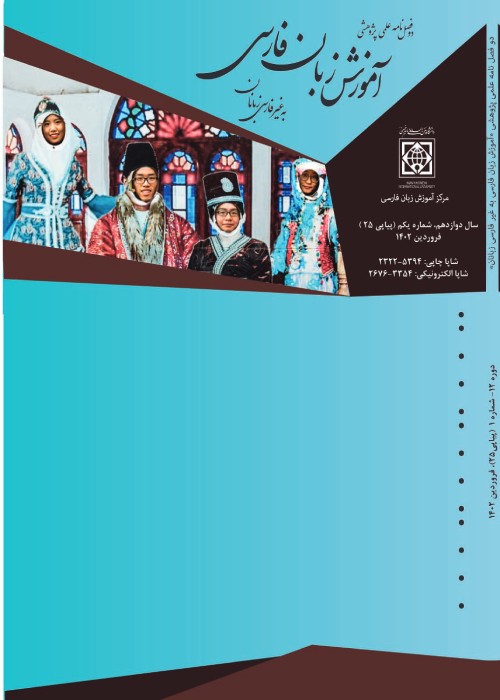The Relationship between Language Learning Strategies and Metacognitive and Motivational Self-regulated Learning: The Case of Persian as a Second Language (PSL) Learners
There is little doubt that learning a language is a challenging task. In the case of languages such as Persian, which do not enjoy the status of an international language and, consequently, the extensive investment of international agencies, the task of learning appears to be even thornier. To overcome this thorny task, language learners need to be quite motivated and self-regulated. The underlying assumption behind the present study was that some of the language learning strategies that language learners employ might be more strongly connected with their motivational and self-regulated learning. Therefore, the aim of the present study was to investigate language learning strategy use of Persian as Second Language (PSL) learners as predictors of their meta-cognitive and motivational self-regulated learning components.To this end, a sample of 149 male and female B.A level non-Iranian learners of Persian at Imam Khomeini International University in Qazvin, Iran were selected through convenience sampling based on availability. The selected participants were then asked to fill in two questionnaires including the translated version of the Strategy Inventory for Language Learning (SILL) and the Motivated Strategies for Learning Questionnaire (MSLQ). The participants were required to answer the questionnaire by choosing the right alternative from among five choices on a Likert type scale. The collected data were summarized, processed and analyzed using four separate stepwise multiple regression analyses. To see how strong the relationship between the meta-cognitive self-regulated learning and each of the predictors is, the unstandardized as well as standardized coefficients of the three models, along with the observed t-values and significance levels were checked. The results showed that, from among the language learning strategies, cognitive, compensation, and meta-cognitive strategies could make significant contribution to predicting meta-cognitive self-regulated learning. Moreover, meta-cognitive, memory, and affective strategies turned out to be significant predictors of task value. Meanwhile, meta-cognitive strategies and task value shared about 18%, and meta-cognitive and memory strategies together shared over 25% of variance with task value. Meta-cognitive, memory, and affective strategies collectively accounted for about 27% of the total variance with task value. The findings also showed significant relationships between meta-cognitive strategies and control of learning beliefs. In fact, meta-cognitive strategies entered into the regression equation as the single predictor of control of learning beliefs and meta-cognitive strategies and control of learning beliefs shared over 8% of variance. It also turned out that for every one standard deviation of change in meta-cognitive strategies score, there was .30 of a standard deviation change in the control of learning beliefs score. In addition, to examine the relationship between types of language learning strategies and test anxiety as a component of motivational self-regulated learning, another stepwise multiple regression procedure was used. Based on the results, the single negative predictor of test anxiety was compensation strategies. The result further indicated that for every one standard deviation change in one's compensation strategies, there will be .23 of a standard deviation negative change in one's test anxiety. These findings may have theoretical and pedagogical implications for language learners, teachers, and syllabus designers. If teachers and materials developers are cognizant of the nature of the relationships between meta-cognitive and motivational self-regulated learning components and language learning strategy use, they will be better prepared to make more informed decisions about introducing and encouraging the use of certain types of strategies (and probably discouraging the use of certain other less productive or counterproductive strategies) in the classroom, or about using useful instructional books and materials to encourage students to use those language learning strategies which have predictive power on meta-cognitive and motivational self-regulated learning components (task value, control of learning beliefs, and test anxiety). By designing the right kind of materials and adopting the right kinds of teaching activities (which require the students’ use of certain strategies), materials developers and teachers may be able to contribute to improving learners’ motivation and self-regulation, and by so doing, help improve learners’ achievements. The knowledge of how language learning strategies are related to metacognitive and motivational self-regulated learning can also help learners become more self-regulated and motivated. If they know that certain learning strategies are closely connected with being motivated and self-regulated, they will be more open and receptive to those strategies and will avoid resisting to use those strategies. Alternatively, they may come to the realization that some strategies are not very useful in this regard, and that they should not be overused.
- حق عضویت دریافتی صرف حمایت از نشریات عضو و نگهداری، تکمیل و توسعه مگیران میشود.
- پرداخت حق اشتراک و دانلود مقالات اجازه بازنشر آن در سایر رسانههای چاپی و دیجیتال را به کاربر نمیدهد.



